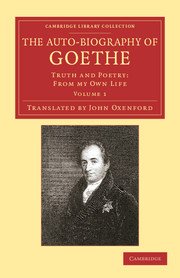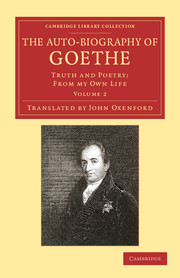Refine search
Actions for selected content:
12661 results in History of science
SEPTIÈME CLASSE - Dicotylèdones caliciflores Pages 151 to 323
-
- Book:
- Histoire naturelle des drogues simples
- Published online:
- 18 December 2014
- Print publication:
- 08 May 2014, pp 151-323
-
- Chapter
- Export citation
Introduction
-
- Book:
- Histoire naturelle des drogues simples
- Published online:
- 18 December 2014
- Print publication:
- 08 May 2014, pp 1-29
-
- Chapter
- Export citation
QUATRIÈME PARTIE. — ANIMAUX
-
- Book:
- Histoire naturelle des drogues simples
- Published online:
- 18 December 2014
- Print publication:
- 08 May 2014, pp 1-4
-
- Chapter
- Export citation
Frontmatter
-
- Book:
- Histoire naturelle des drogues simples
- Published online:
- 18 December 2014
- Print publication:
- 08 May 2014, pp i-iv
-
- Chapter
- Export citation
ERRATUM
-
- Book:
- Histoire naturelle des drogues simples
- Published online:
- 18 December 2014
- Print publication:
- 08 May 2014, pp xii-xii
-
- Chapter
- Export citation
QUATRIÈME CLASSE. — LES POISSONS
-
- Book:
- Histoire naturelle des drogues simples
- Published online:
- 18 December 2014
- Print publication:
- 08 May 2014, pp 153-181
-
- Chapter
- Export citation

The Auto-Biography of Goethe
- Truth and Poetry: From my Own Life
-
- Published online:
- 05 May 2014
- Print publication:
- 21 February 2013
- First published in:
- 1848

The Auto-Biography of Goethe
- Truth and Poetry: From my Own Life
-
- Published online:
- 05 May 2014
- Print publication:
- 21 February 2013
- First published in:
- 1849
PART III
-
- Book:
- The Elements of Medical Chemistry
- Published online:
- 05 November 2014
- Print publication:
- 24 April 2014, pp -
-
- Chapter
- Export citation
WATER
-
- Book:
- The Elements of Medical Chemistry
- Published online:
- 05 November 2014
- Print publication:
- 24 April 2014, pp 255-295
-
- Chapter
- Export citation
ELECTRICITY AND ITS CHEMICAL AGENCIES
-
- Book:
- The Elements of Medical Chemistry
- Published online:
- 05 November 2014
- Print publication:
- 24 April 2014, pp 228-244
-
- Chapter
- Export citation
IODINE
-
- Book:
- The Elements of Medical Chemistry
- Published online:
- 05 November 2014
- Print publication:
- 24 April 2014, pp 338-341
-
- Chapter
- Export citation
ERRATA AND CORRECTIONS
-
- Book:
- Arctic Zoology
- Published online:
- 05 November 2014
- Print publication:
- 24 April 2014, pp 599-599
-
- Chapter
- Export citation
DIV. III - PINNATED QUADRUPEDS, Or, with FIN-LIKE FEET
- from CLASS I - QUADRUPEDS
-
- Book:
- Arctic Zoology
- Published online:
- 05 November 2014
- Print publication:
- 24 April 2014, pp 143-183
-
- Chapter
- Export citation
CONTIGUOUS ATTRACTION
-
- Book:
- The Elements of Medical Chemistry
- Published online:
- 05 November 2014
- Print publication:
- 24 April 2014, pp 61-81
-
- Chapter
- Export citation
TABLE of the specific gravities of solid and liquid substances
-
- Book:
- The Elements of Medical Chemistry
- Published online:
- 05 November 2014
- Print publication:
- 24 April 2014, pp 589-590
-
- Chapter
- Export citation
PRUSSIC ACID, OR HYDRO-CYANIC ACID
-
- Book:
- The Elements of Medical Chemistry
- Published online:
- 05 November 2014
- Print publication:
- 24 April 2014, pp 357-362
-
- Chapter
- Export citation
CONTENTS
-
- Book:
- Arctic Zoology
- Published online:
- 05 November 2014
- Print publication:
- 24 April 2014, pp 188-190
-
- Chapter
- Export citation
TABLE OF WEIGHTS AND MEASURES
-
- Book:
- The Elements of Medical Chemistry
- Published online:
- 05 November 2014
- Print publication:
- 24 April 2014, pp 587-587
-
- Chapter
- Export citation
SALTS
-
- Book:
- The Elements of Medical Chemistry
- Published online:
- 05 November 2014
- Print publication:
- 24 April 2014, pp 424-468
-
- Chapter
- Export citation
